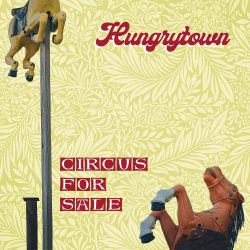Vermont duo hopes their mixture of updated folk and dream pop will put Hungrytown on the map.
 In 1993, Rebecca Hall (lead vocals/guitar) met Ken Anderson (harmony vocals/multi-instrumentalist) and married one year later. Fast-forward ten years and the two musicians have quit their day jobs, leaving behind the hustle and bustle of New York City for the green mountains of Vermont, choosing the name Hungytown and taking the plunge into the crowded pool of full-time working musicians.
In 1993, Rebecca Hall (lead vocals/guitar) met Ken Anderson (harmony vocals/multi-instrumentalist) and married one year later. Fast-forward ten years and the two musicians have quit their day jobs, leaving behind the hustle and bustle of New York City for the green mountains of Vermont, choosing the name Hungytown and taking the plunge into the crowded pool of full-time working musicians.
If there ever was a place that would scrub the din of the big city from their music, rural Vermont was it. Just about anywhere you go there, it seems like another world where you might stumble upon an eighteenth-century farmhouse or find an old stone wall in the forested hillside. These aged features of the landscape along with the variety of seasons can be a factor in reconstructing the way you look at the music of living.
“From our porch on a summer evening, it’s sometimes hard to tell where the fireflies end and the stars begin,” Hall muses. “I used that imagery to begin describing the changing seasons in Vermont.”
There is no escaping that this marked difference in geography erased memories of a hurried way of life, allowing them room to conjure the new emotions culled from vastly different surroundings. The relocation was eliciting the latent potential in their music.
Hall sings with a lullaby-like gentleness in tones that bring to mind the silvery stylings of Judy Collins mixed with the wispy whimsy of Harriet Wheeler (The Sundays), a natural fit for their music, which blends old-time folk modernized with a flavour of dream pop. The songs are dripping with sentimentality as she sings with a breezy ease, her imagery colourful though vague at times: “Autumn, one last muted show / Of colour just before the snow,” and “We don’t need to be forgiven / Shadows rolled me down a hill.”
Her delicate voice rising over an aching sadness informs ‘Feel Like Falling,’ which is about bringing Anderson’s elderly mom from Boston to Vermont so they could act as caregivers protecting her from a propensity for falling. “All of this time / The way you just feel like falling / Feel like breaking down.” Perhaps the result of their generosity initiated some self-preservation as well.
The album opens with ‘Another Year,’ an ode to the changing seasons, inspired by the magical melancholy of late 1960s psychedelia with poetic lyrics and plenty of references to the natural world. “Autumn, one last muted show / Of colour just before the snow / Another year falls prey to ice / On passageways and endless nights.”
While touring in England, they were hosted by a gentleman who described seeing an actual circus for sale, right down to the horses, monkeys and a tired, dejected old lion in a cage. Hence the title song, ‘Circus for Sale,’ which brings to mind the clever aphorism “Too many freaks and not enough circuses.” Hall explains how the symbolism and imagery were so woefully relevant, expressed lyrically: “And a place for us freaks / To call home for a while …. We’ll be left on our own / To watch the pale morning arrive.”
Hungrytown’s songs are steeped in nostalgia, traumas and anecdotal triumphs. The spectrum of loneliness, loss and blinding love appears on ‘Gravity,’ which Hall terms as a suffix to the title song. “It’s much easier now to fill in the days since you left / And it’s not just the clothes that you wore, it’s the words that you said.” Similar emotions are found in ‘Man of Poor Fortune,’ composed during their years in New York when violinist Rachel Birkin was part of the band. “We were delighted when she agreed to grace this updated version with her talents 23 years later,” Hall said in conveying her gratitude.
Anderson’s role is to assemble the arrangements along with playing multiple instruments and contributing pleasant harmonies. Undoubtedly their music is rooted in folk traditions, these songs actually sounding more like they were parented in the British Isles before being raised in rural Vermont. You can’t shake a harmonious stick without coming upon a plethora of musicians attempting to evoke old-timey folk in contemporary shades. Hungytown does this well, drawing the listener in with a wisp of breeze that accesses the ache of life’s fleeting nature while offering a soothing balm for its discomfort. All the while, Hall’s voice drifts through each note like a fading memory.
In the end, you are left with the impression that the couple would prefer existing in the serenity of a more peaceful, quiet world, and ‘Circus for Sale’ acts as an extension of that desire. But who knows? Should their 4th album be a success, Vermont may name a town after them. Hungrytown, Vermont does have a nice ring to it.


